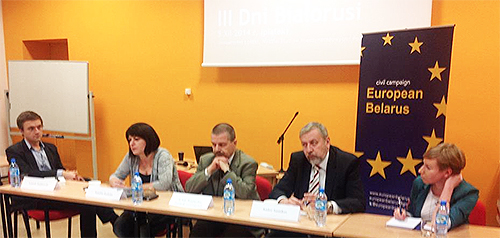Andrei Sannikov: It's second wave of liberation of Europe
36- 8.12.2014, 11:46
- 79,662
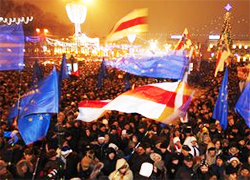
Power is expected to be changed in Belarus, too.
A discussion “Belarus – Closer to Europe or Russia?” was held on December 5 as part of Days of Belarus in the University of Lodz, one of Poland's biggest universities. The discussion was attended by Andrei Sannikov, the leader of the European Belarus civil campaign; Przemysław Żurawski vel Grajewski, a famous Polish politologist, expert on Eastern Europe; Leszek Jażdżewski, a politologist and columnist; and Natallia Radzina, the editor-in-chief of charter97.org.
The discussion was organised by the University of Lodz and the European Belarus civil campaign.
The regime in Belarus is rather Latin American than European or Russian. The model uses severe repression to cancel or falsify election and strengthen the clan or the “family”, Andrei Sannikov thinks.
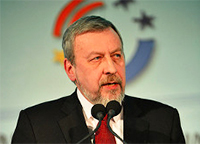
– The situation in Ukraine is in focus today. In Belarus, forming views on the [Ukrainian] events is to a great extent influenced by Russian propaganda. I remember the rather quiet times of 2005-2010. Yes, we had the dictatorship and repression, but we had rather good relations with our neighbours – Russia, Ukraine and Poland. Belarusians has European aspirations, it was an obvious trend. I ran in the presidential elections as a candidate from the European Belarus campaign. Actually, we were going to win the elections. The European platform attracts people, but we are in a difficult situation today, because Ukraine has shown the inability of the authoritarian regime to cooperate with Europe. What we have in Belarus is not authoritarianism but dictatorship. Lukashenka has been in power for almost 21 years, so Putin and Yanukovych learnt from him.
The Ukrainians demonstrated a miracle of courage and bravery and deposed the Lukashenka-style regime that began to develop in their country. They did something unbelievable for our region – they showed they do not want to live under the authoritarian regime and the Kremlin's power, they paved the way for all of us. In my view, it is the second wave of the liberation of Europe.
The first wave freed Poland, Czechoslovakia and all countries of the Warsaw Pact but the Soviet Union during the “perestroika”. It was rather easy, because the “empire of evil” was ruled by Mikhail Gorbachev, who had dictatorial power but wasn't a dictator.
I recall the conversation of Stanislau Shushkevich and Lech Walesa. I was present during the conversation, so I guarantee that quotes are accurate. Shushkevich said: “Lech, you are a hero for us, you are a legend and liberator.” Walesa answered: “No, Stas, you are the hero. If you hadn't broken the Soviet Union, Russian tanks wouldn't have left the country.”
It is an absolutely different situation today. We do not have the “perestroika” today. We see the restoration of the empire. Instead of Gorbachev, we have Putin who initiated a war in Ukraine. But the wave of liberation started from Ukraine and it will continue. We should remember that people in Belarus and all post-Soviet countries need solidarity and support, Andrei Sannikov said.
Natallia Radzina noted the current hopes of Europe to regard Lukashenka as an ally in the confrontation are absolutely futile.
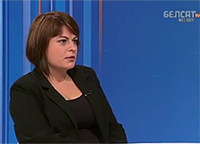
– Lukashenka has never agreed to cooperate with Europe. He only traded with Europe. He sold oil products, potassium and human beings – political prisoners whom he exchanged for western loans. Putin really learns from Lukashenka. Belarus was a training range for repression against opposition. It was a exam for Europe, and Europe didn't pass it. Its reaction to the dictatorship in Belarus was weak, and insignificant sanctions could not make the regime stop violating human rights.
Lukashenka did what the Soviet occupation of Belarus didn't do. He, in fact, eliminated the Belarusian language, history and culture. He behaves like an occupant in the occupied territory.
Belarus is a European country historically and geopolitically. When Europe is trying to defend Ukraine, it should not forget about Belarus. The attempts to defend Ukraine will remain futile for as long as the pro-Kremlin dictatorial regime exists near Ukraine. It is also a direct threat to Poland. It is a mistake to think that the Russian Empire, which Putin now tries to restore, is only Belarus, Ukraine, Moldova and Georgia. It also includes Poland, Lithuania, Latvia and Estonia. War has been declared on entire Europe.
Doctor Przemysław Żurawski vel Grajewski gave a clear answer to the question in the discussion topic: Belarus is Europe.
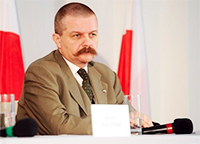
– I'd like to recall a story by Melchior Wańkowicz titled The Hospital in Cichiriicze about Polish corps in Russia. The film The Gateway of Europe was based on the story.
The gateway to Europe is a territory between the Dvina and the Dnieper with Vitebsk in the north and Smolensk in the south. This is the route that was used to attack Rzeczpospolita since its foundation. This is the route Napoleon used in its march to Moscow. The title gateway to Europe shows that Belarus is on our side, in Europe. It is the fundamental answer to the question “Is Belarus closer to Europe or Russia?”
The matter is what going on in Russia, because Russia is the main factor of territorial and political revisionism in Europe.
We should realise that we can rely only on ourselves, on the Poles, Belarusians, Lithuanians, Latvians and Estonians. We should not hope much in the Germans and French. They have other priorities.
The Western European countries are as ready to pay for the democratisation and liberation of Ukraine and Belarus and for confrontation with Russia as Poland is ready to pay for the democratisation of Morocco, Algeria or Libya. Our support reduces to our best wishes to these countries.
Europe's game with Russia over Belarus is determined by the countries of our region to take definite actions. I mean mainly Poland and Lithuania. Firstly, their efforts become weaker; secondly, their efforts are not coordinated any more; thirdly, Poland has lost its common approach in the foreign policy, especially in the eastern policy.
The peculiarity of the Belarusian regime is that we don't have much leverage. The collapse of the Yanukovych regime happened the day after the EU announced that it would impose sanctions against the Ukrainian oligarchs who have property in the West. It's a different situation with Belarus. The country does not have any oligarchs who could be sanctioned and made to rebel against the dictator. The dictatorship in Belarus is much more consolidated than that in Ukraine.
The European Union has neither political will nor interests to change the situation in Belarus. None of the EU main member states except for Germany has interests in the East. But Germany has always had Russia as its main partner. However, we observe the deterioration in the Russian-German relations.
Poland also made an attempt to play with the dictator, when the foreign ministers of Poland and Germany visited Belarus ahead of the 2010 elections. The attempt was doomed to failure since the very beginning. The dictatorial regime always has more opportunities than a democratic government. Games with the dictator were lost, as expected.
Poland failed to carry out its foreign policy in two directions, as it was declared in the early 1990s. There were hopes even for military cooperation with Belarus during a short period before Lukashenka. The cooperation within European regions also failed. No one even found a formula for possible actions in this direction. The EU's Eastern Dimension project that was promoted by prime minister Włodzimierz Cimoszewicz failed. Poland has not provided any active policy in the East since 2007.
What can Poland do in addition to the support to opposition and the independent media? The Belarusians should have an opportunity to watch films like Braveheart, but about the battle of Orsha; films like Major Hubal, but about Stanislau Bulak-Balakhovich; series like the Polish series about Nicolaus Copernicus, but about Frantsysk Skaryna, the Slutk Uprising, Kastus Kalinouski, January Uprising of 1863, the Union of Lublin. It would show both the Belarusians and Poles that the Polish-Lithuanian union was actually the union of Poland and Belarus.
The real political victory over the regime will happen only after children will play and imagine themselves as soldiers of Hetman Ostrogski and Bulak-Balakhovich instead of soldiers of Suvorov or Soviet soldiers. It will be the breaking point.
Freedom is painful. The example of Ukraine proved it. It cannot be a result of talks, let alone talks with Russia. It must be backed by historical and moral conscience that should be built.
We need to count on ourselves, on the nations of former Rzechpospolita. We have always felt united in the face of a common threat, and this threat continues to exist today, Prof. Przemysław Żurawski vel Grajewski said.
Columnist Leszek Jażdżewski is sure that Europe will have to look closer at Belarus, because political changes will be begin here soon.
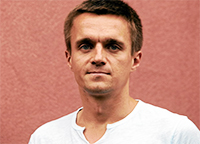
– In policy, Poland has something that I would called Belarusian fatigue. Europe has never been interested in Belarus at all. We have been observing this fatigue since the latest protests in Minsk that inspired hopes and were brutally suppressed by the authorities.
I think Belarus will soon face a serious economic crisis followed by political protests. We will have to look at Belarus again, because the regime can be replaced by a more pro-Putin one.
Poland fears today that the Russian empire will lie close to its borders. It means that we need to review our eastern policy. I think that an independent Belarusian state based on strong national conscience is better than post-Soviet mentality. Independence is more profitable strategically for Poland.
We should help Belarus form civil and political conscience so that Belarus could have its own Solidarity movement, Jażdżewski said.
After the discussion, students of the University of Lodz watched the film by Madeleine Sackler Dangerous Acts Starring the Unstable Elements of Belarus and wrote letters to the Belarusian political prisoners.
